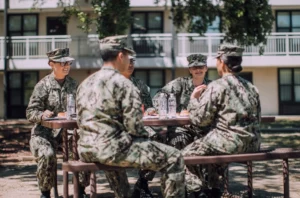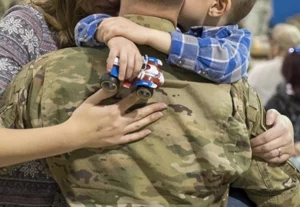Being in a military relationship comes with its own set of challenges and rewards. The unique circumstances that military personnel and their partners face require special attention and understanding. In this article, we will delve into the world of military relationship advice, offering valuable insights, strategies, and support for those navigating love in uniform.
Contents
Understanding The Military Lifestyle
 The military lifestyle refers to the unique way of life experienced by individuals serving in the military. It encompasses various aspects such as discipline, structure, teamwork, sacrifice, and a strong sense of duty. Understanding the military lifestyle can provide insight into the challenges, rewards, and values associated with military service.
The military lifestyle refers to the unique way of life experienced by individuals serving in the military. It encompasses various aspects such as discipline, structure, teamwork, sacrifice, and a strong sense of duty. Understanding the military lifestyle can provide insight into the challenges, rewards, and values associated with military service.
Discipline is a fundamental aspect of the military lifestyle. Military personnel adhere to strict rules and regulations, which govern their behavior, appearance, and daily routines. This discipline helps to create order, maintain unit cohesion, and ensure the safety and success of military operations.
The structure is another key element of the military lifestyle. Military personnel operates within a hierarchical system, with clear chains of command and well-defined roles and responsibilities. This structure allows for efficient decision-making, effective communication, and coordinated teamwork.
What Are The Challenges Of A Military Relationship?
 Military relationships, particularly those involving service members, can face a set of unique challenges due to the nature of military service.
Military relationships, particularly those involving service members, can face a set of unique challenges due to the nature of military service.
Some of the common challenges faced in military relationships include:
- Separation: Deployments, training exercises, and other military commitments often require service members to be away from their partners for extended periods. Long-distance separations can strain the emotional and physical connection between couples, leading to feelings of loneliness and anxiety.
- Uncertainty and unpredictability: Military life is characterized by a certain degree of uncertainty. Deployment schedules may change, and service members may be called away at short notice. This unpredictability can make it difficult to plan future events, create stability in the relationship, or maintain a routine.
- Emotional and mental stress: The demands of military service can place significant emotional and mental stress on service members, which can also affect their relationships. Experiencing traumatic events, witnessing combat, or dealing with the pressures of their responsibilities can lead to anxiety, post-traumatic stress disorder (PTSD), and other mental health issues that can impact the dynamics of a relationship.
- Communication challenges: Communication during deployments or training can be limited and sporadic. Service members may have limited access to phone calls, internet, or mail, making it challenging to stay connected with their partners. Communication gaps can lead to feelings of frustration, and misunderstanding.
- Adjustment to civilian life: Transitioning from military to civilian life can pose challenges for both the service member and their partner. The military lifestyle often involves a strict routine, clear roles, and a structured environment. Adjusting to the freedoms, choices, and different expectations of civilian life can be a significant adjustment for both parties.
It is important for couples in military relationships to communicate openly, support each other, and seek resources such as counseling or support groups when needed. Understanding and acknowledging the unique challenges of military relationships can help partners navigate these difficulties and strengthen their bond.
Advice To Keep A Military Relationship Strong
Maintaining a strong military relationship requires effort, understanding, and effective communication. Here are some tips to help keep a military relationship strong:
Effective communication
Communication is key in any relationship, and it becomes even more crucial in a military relationship. Make the most of the available communication channels, such as phone calls, video chats, emails, and letters, to stay connected. Be open, honest, and understanding with each other, sharing your thoughts, feelings, and experiences.
Establish routines
Establishing routines in a military relationship means creating regular schedules and habits for communication, and shared activities, and maintaining a sense of connection. It provides stability, predictability, and a sense of normalcy, even during periods of separation. Routines help partners stay connected and ensure that important aspects of the relationship are consistently prioritized.
Support each other’s roles
 Supporting each other’s roles in a military relationship means understanding and appreciating the unique challenges and responsibilities faced by each partner. It involves providing emotional support, being understanding of the demands of military service, and recognizing the importance of their role. It means standing by each other and offering encouragement.
Supporting each other’s roles in a military relationship means understanding and appreciating the unique challenges and responsibilities faced by each partner. It involves providing emotional support, being understanding of the demands of military service, and recognizing the importance of their role. It means standing by each other and offering encouragement.
Foster independence and self-care
While it’s important to support each other, it’s also crucial to maintain a sense of independence and take care of your own well-being. Pursue your own interests, hobbies, and goals, and encourage your partner to do the same. Taking care of yourself will help you stay strong and maintain a healthy balance in the relationship.
Seek support from the military community
Military relationships can benefit from the support and understanding of others who are going through similar experiences. Connect with other military families and support groups, both online and in person. Sharing experiences, advice, and resources can provide a sense of camaraderie and reassurance.
Plan for the future
Planning for the future in a military relationship involves discussing and creating a vision for life beyond military service. It includes setting goals, making long-term plans, and considering factors such as education, career transitions, and personal aspirations. Planning for the future provides a sense of direction, hope, and stability, allowing the couple to envision a life together beyond the challenge.
Make the most of the time together
Making the most of the time together in a military relationship means maximizing the quality and significance of the moments spent with your partner. It involves prioritizing and fully engaging in shared activities, creating lasting memories, and appreciating each other’s presence. It means being present, expressing love and affection, and valuing the time spent together, even if it’s limited.
When To Consider Professional Advice In Military Relationships?
 Here are some key points to consider regarding when to seek professional help in a military relationship:
Here are some key points to consider regarding when to seek professional help in a military relationship:
- Persistent conflicts: If conflicts and disagreements within the relationship are frequent, intense, and unresolved, professional help can provide guidance in resolving issues and improving communication.
- Communication breakdown: If communication between partners has become ineffective, leading to misunderstandings, miscommunication, or constant arguments, professional help can assist in restoring healthy and effective communication patterns.
- Emotional or mental health concerns: If one or both partners are experiencing emotional distress, anxiety, depression, or other mental health issues that are impacting the relationship, seeking professional help can provide support and interventions to address these challenges.
- Difficulty adjusting to military life: Military life presents unique challenges, such as frequent separations, deployments, and relocation. If adjusting to these challenges is causing significant stress, the strain on the relationship, or difficulty in maintaining connection, professional help can offer guidance in coping and adapting to the military lifestyle.
- Loss of familiarity and connection: If the emotional or physical intimacy in the relationship has diminished or if there is a sense of disconnection between partners, seeking professional help can help reignite the spark and rebuild a stronger bond.
- Inability to resolve issues independently: If the couple has tried to resolve issues on their own but finds themselves stuck in a cycle of recurring problems or is unable to find solutions, professional help can provide an objective perspective and proven techniques to navigate challenges.
- Impact on well-being and functioning: If the relationship is significantly impacting the well-being, mental health, or overall functioning of one or both partners, seeking professional help is crucial to address these concerns and work towards a healthier and happier relationship.
Remember, seeking professional help is a proactive step towards strengthening the relationship and improving overall well-being. It can provide valuable tools, strategies, and support to navigate the unique challenges that military relationships often face.
Conclusion
In conclusion, maintaining a strong military relationship requires understanding, effort, and effective communication. Embracing the challenges unique to military life, such as separations, uncertainty, and sacrifice, is essential. By establishing routines, supporting each other’s roles, planning for the future, and making the most of the time together. While seeking professional help when needed, couples can navigate the difficulties and build a resilient and fulfilling relationship. Remember, with open communication, patience, and a shared commitment to each other. As military relationships can thrive and withstand the tests of time, distance, and adversity.
Relationships are complex, and it’s natural for issues to arise along the way. If you have any queries regarding Relationship Counseling experienced therapists at CoupleMantra can help: Book a trial couple therapy session.


